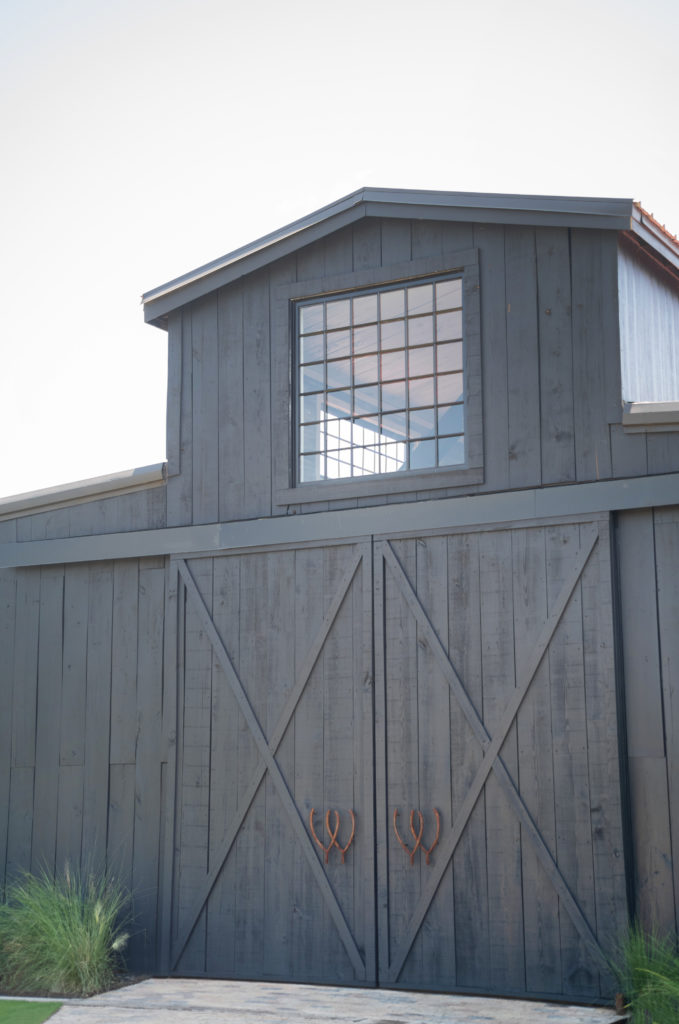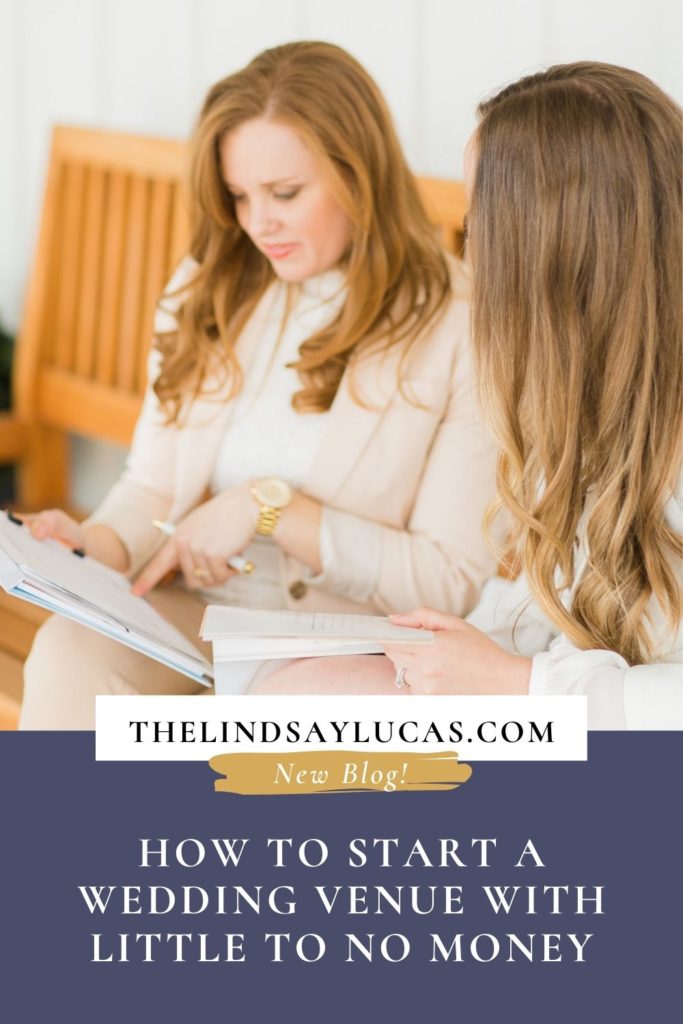Part I – How to Start a Wedding Venue With Little to No Money
“Lindsay, how do I start a wedding venue if I don’t have any money?” This is the number one question I get! When I first announced The Venue Podcast on Instagram, I had multiple people commenting on the post asking me the same thing: How do I start a wedding venue with little to no money? Even before that post, multiple people would email me asking this same question. There were so many people who wanted to start a wedding venue or upgrade their current venue, but they didn’t have a lot of personal investment or savings. I created the free Profit Planner to help with this.
This topic takes a bit more time to cover. That’s why I’ve decided to break it up into two parts so that I can do a deep dive and not leave anything out. For even more helpful information and tools, take my course ‘Funding 101’!
Basically, in my experience, there are five viable options on how to start a wedding venue with little to no money. In this article, I’m going to unpack the first two options, and in part two, I’ll cover the last three.
But before I dive into that, I want to address this second question that’s really in the same lane as the first: If I want to start a wedding venue, what is the probability that a bank will fund a business with no capital? This is a genius question! I’m not an attorney, a loan officer, or a bank. Everything I know about how to start a wedding venue is based on my own personal experience in the industry. So take this information and feel empowered, but do take that extra step and ask your loan officer or attorney.
Before we jump in, it’s not too early to start thinking about what type of wedding venue investor you are. Plain and simple, if you’re going to run a venue, you’re an investor, so check out my article about determining what type of wedding venue investor you are!
You don’t have to be the sole owner of a brand new venue in order to start a wedding venue
There are so many different options when you’re figuring out how to start a wedding venue with little to no money! You can look into lease-to-own options or strictly leasing options. What does that mean, exactly? It means leasing the wedding venue from the person who actually owns the building. It could be a strict lease, where you are renting but you’re running the wedding venue business. Or, if you are interested in owning that space and the owner is interested in selling that space, you can come up with a lease-to-own agreement with the venue owner.
Keep an eye out for existing buildings that already have a commercial designation, because these are less of an investment when you’re trying to start a wedding venue.
You don’t want to have to go through the process with the county to transition something that’s residential to commercial. That is definitely an option, especially if you live somewhere, say in the South. Maybe there’s a beautiful historic mansion home that you want to convert into something that’s commercial and start a wedding venue. However, there are a lot of costs that come with that. Typically, when you’re wanting to start a wedding venue, look for a building that needs little to no renovation if you don’t have a lot of money to invest upfront.
It’s also a good idea to immediately ask for a two-year lease when you start a wedding venue. The reason for this is because as soon as you get access to the building and when your lease starts, you’re already paying your monthly rent. However, it’s still going to take you a little while to get your business off the ground when you first start.
Typically, whenever you book a bride, the average engagement is anywhere from 9 to 18 months, so you’re going to have that little bit of lag time. For these reasons, a two-year lease is a smart idea when you start a wedding venue.
For wedding venue investors who want to start a wedding venue with little to no capital, leasing is a good option!
If you have your heart set on building your very own venue from scratch when you first start, but you have no money, a bank isn’t going to give you as large of a loan as you need to make your wedding venue dreams come true.
Leasing is the perfect way to get your feet underneath you, to be able to document all of your bookings, take a look at your conversion rate, and be able to present the bank with your business plan that says, “Hey! I’ve been doing this for two years now! Here’s my track record, here’s my conversion rate and my experience. I know what I’m doing. You can put your faith and trust in me!”
This helps bulk up your business plan, which is a primary factor when you’re requesting funding for your venture.

You need a two-year lease
If you’re looking at a current building and the landlord isn’t comfortable with giving you a lease longer than a year, move onto the next one because it’s going to be difficult to build a business in a year when you first start a wedding venue.
If the landlord is already not willing to give you a two-year lease, you may not be able to renew with them. This could be a problem because, as you know, weddings book out 12-18 months in advance so by the time your renewal comes up, you could already have booked brides. What if your relationship with your landlord sours and you already have couples on the books because you didn’t know what your renewal period was or you didn’t get that two-year lease option? Signing a two-year lease when you start a wedding venue is always a good idea!
Be mindful of how you are accepting payments when you start a wedding venue
Another thing about leasing when you start a wedding venue is you need to keep an eye on how you’re accepting payments. This has to be part of your lease plan when it comes to your couples.
A lease, obviously, is a monthly rental fee. You may want to consider not splitting your venue rental rate into four equal payments and instead, require 50% down from your couples because you need some of that money to pay your lease when you first start a wedding venue.
So, keep an eye on how you’re accepting payments and what your refund policy is within your venue rental agreement because it’s going to directly impact how you’re bringing money into the business and how you’re divesting that into your lease.
Owner finance options
Essentially, owner financing means that when you buy a business, the person who owns the business is going to front your loan. They’re going to finance your loan to pay for the business that they’re selling to you to start a wedding venue. So, you’re not getting a loan from a bank, from other investors, or from family or friends, etc.
An existing venue owner might not want to sell their venue outright. Perhaps they want to be a little bit in the game, show you the ropes, and make sure they are passing the legacy of their business over to someone who is going to continue to grow the business down the path it is already on. The venue owner will help you find your footing because, if they’re financing you, they want the business to be successful.
There are a lot of different options when it comes to owner financing when you start a wedding venue. Owner financing isn’t really advertised. You’re not going to see an ad that says, “Venue For Sale! Owner finance options available!” This kind of information can be gathered through your current network and keeping an eye out for those wanting to sell their venue.
There are “polite” ways to find this kind of information when you start a wedding venue. What you don’t want to do, unless you have a good relationship with a venue, is go and knock on venue owners’ doors asking them if they want to sell their venue.
Instead, talk to your network and put out some feelers as you set out to start a wedding venue. Most of the time, venue owners who are considering selling are still in operation. With most venues that go up for sale, even privately, there’s a huge amount of doubt in the back of the owners’ minds. They’re wondering, “What’s my plan B if this doesn’t sell?” They don’t want to just start blasting out that the venue is for sale because both their current and interested brides might catch wind of it and not book with them in fear of the venue being sold. Reach out to the owner privately. Be respectful, discrete, and honor their privacy.
Okay, friends, that’s a wrap for now! I hope these first two options on how to start a wedding venue with little to no money has left you dying to know the other three! Head on over to my Profit Planner to start thinking about which could work for you.
Don’t worry, I’ll get into them in the next article, so if you’re ready for more, click the link for part two in this series: Part II – How to Start a Wedding Venue With Little to No Money!
In the meantime, if you want to know more about how to start a wedding venue, and you’re not sure how to go about it, don’t hesitate to reach out to me!
DID YOU ENJOY THIS ARTICLE? PIN IT FOR LATER…

Affiliate Disclosure
& Content Disclaimer
This post may contain affiliate links from a paid sponsor, Amazon or other program. When you use these links to make a purchase I earn a small commission at no extra cost to you. This allows me to continue creating the content that you love. The content in this article is created for information only and based on my research and/or opinion.
Affiliate Disclosure
& Content Disclaimer
This post may contain affiliate links from a paid sponsor, Amazon or other program. When you use these links to make a purchase I earn a small commission at no extra cost to you. This allows me to continue creating the content that you love. The content in this article is created for information only and based on my research and/or opinion.